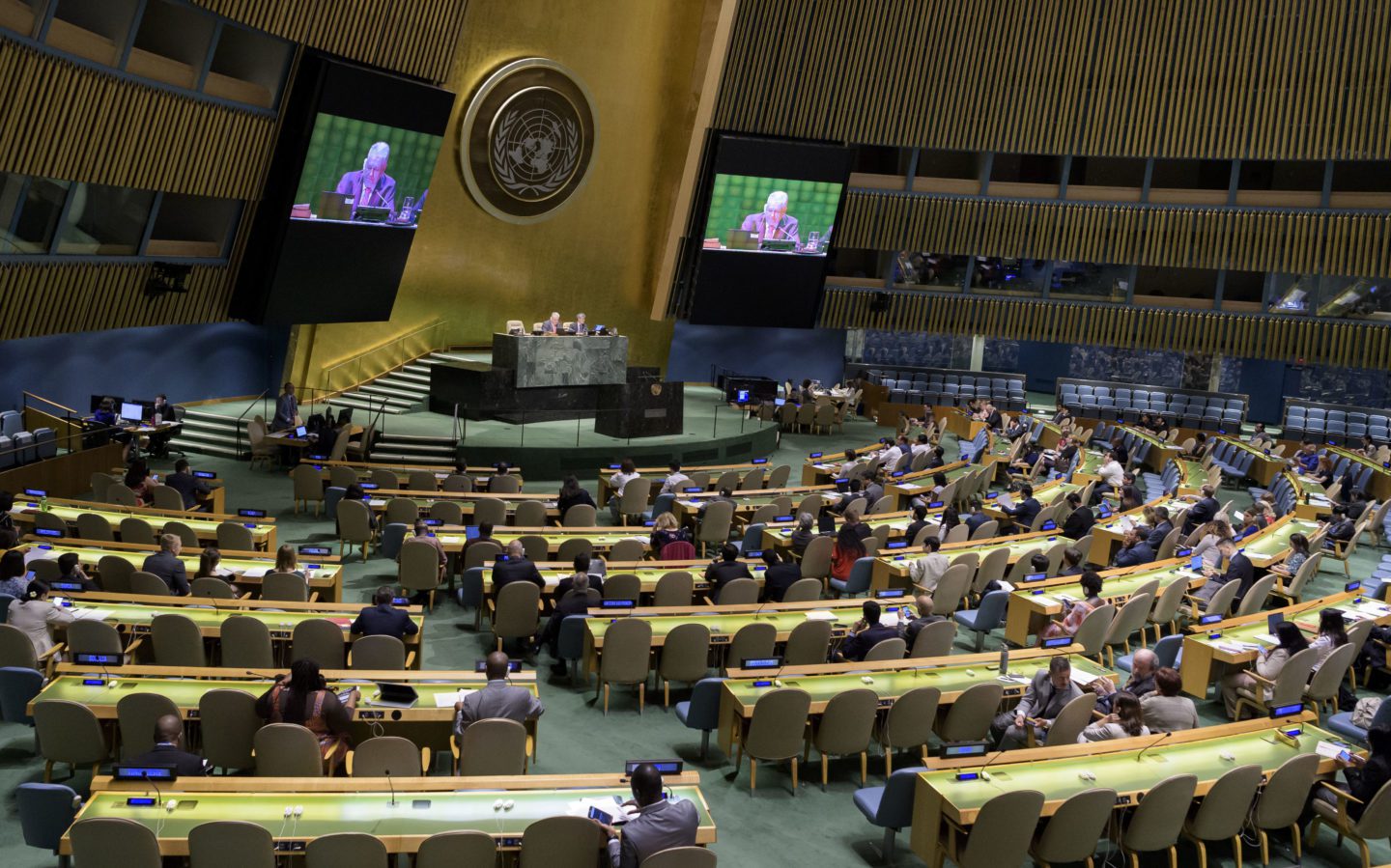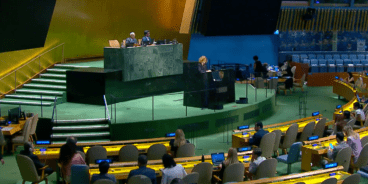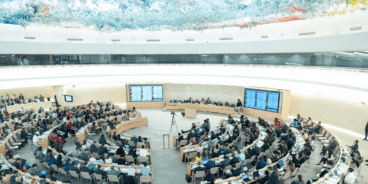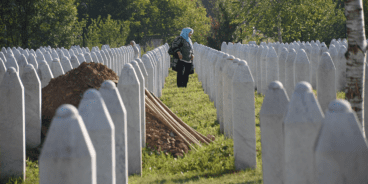

Summary of the 2019 UN General Assembly Plenary Meeting on the Responsibility to Protect
The UN General Assembly held a plenary meeting on the“Responsibility to Protect (R2P) and the prevention ofgenocide, war crimes, ethnic cleansing and crimesagainst humanity” on 27-28 June 2019 as part of the formal agenda of its 73rd session. The debate constituted the second consecutive year that the General Assembly formally considered R2P. One regional organization (European Union) and 70 member states made statements on behalf of 104 countries.
While the discussion demonstrated broad conceptual agreement on the principle of R2P, member states used the debate to reflect on the widening gap between words and deeds in implementation of the norm. At a time when more than 70.8 million people are displaced by conflict, war and persecution, member states recommitted to taking effective prevention action and timely responses to atrocity risks.
BACKGROUND TO THE DIALOGUE
This year’s plenary meeting marks the second time that R2P has been included on the formal agenda of the General Assembly since a debate was held during January 2009. With the 2005 adoption of paragraphs 138-139 of the World Summit Outcome Document and through Resolution 63/308 at the 2009 debate, states committed to ongoing consideration of R2P. Between 2010-2017 member states held eight informal interactive dialogues on R2P following the release of the UN Secretary-General’s annual report on R2P.
Since 2009 the UN Secretary-General has released eleven reports on the Responsibility to Protect. This year’s report, entitled “Lessons Learned for Prevention,” takes stock of a range of measures that individual states and the international community can undertake while upholding their preventive responsibilities. While outlining measures that states have already undertaken to strengthen their resilience to atrocity crimes, the report emphasizes the various ways that the international community can actively support individual governments in the prevention of genocide, war crimes, crimes against humanity and ethnic cleansing.
PARTICIPATION OVERVIEW
H.E. Ms. María Fernanda Espinosa Garcés, President of the 73rd General Assembly, opened the debate followed by introductory remarks by the UN Secretary-General’s Chef de Cabinet, Ms. Maria Luiza Riberio Viotti. Reflecting upon the gap between words and deeds, Ms. Viotti emphasized to member states that “open and frank exchanges such as this are necessary to dispel misconceptions and mistrust and address double standards.” Noting the recent launch of the UN Strategy and Plan of Action on Hate Speech, Ms. Viotti emphasized that hate speech is often a precursor to hate crimes and encouraged states to support initiatives that help reduce atrocity risks, including alleviating poverty and promoting inclusion.
The remarks of the President of the General Assembly and the Secretary-General’s office were followed by interventions from Denmark on behalf of the Group of Friends of R2P; the European Union (EU) on behalf of its member states as well as Albania, Georgia, Moldova, Montenegro, North Macedonia, and Ukraine; Fiji, on behalf of the Pacific Islands Forum; Marshall Islands, on behalf of the Pacific Small Islands Developing States; Latvia on behalf of the “Baltic Three;” Norway on behalf of Sweden, Iceland, Finland and Denmark; Mexico on behalf of itself and France; and 65 additional member states. Ten fewer states spoke during the 2019 plenary meeting by comparison to the 80 statements delivered on behalf of 113 states during the 2018 meeting.
The statement of the Group of Friends of R2P welcomed the inclusion of R2P on the General Assembly’s formal agenda for the past two years, noting that it “reflects the strong interest of members to share ideas and best practices about how we can collectively improve our ability to prevent genocide, war crimes, crimes against humanity and ethnic cleansing.” Thirty-six members of the Group of Friends of R2P also made statements in their national capacity. Of the 61 members of the Global Network of R2P Focal Points, 39 governments spoke in their national capacity.
The Marshall Islands, speaking on behalf of the Pacific Small Island Developing States, and Malta each spoke for the first time in an R2P debate or dialogue, while Colombia spoke for the first time since 2009. Fifteen states who have participated in all eleven General Assembly discussions on R2P also made statements: Australia, Brazil, Canada, Chile, Costa Rica, Cuba, Germany, Iran, Mexico, Netherlands, Republic of Korea, Switzerland, United Kingdom, United States and Venezuela.
KEY THEMES
The overwhelming majority of participating member states expressed their commitment to paragraphs 138 and 139 of the UN World Summit Outcome Document. Noting that in too many situations the international community is failing to act in the face of clear evidence of atrocity crimes, numerous speakers echoed Bangladesh’s sentiment that “the failure of R2P is not in its principles, but in the states that are unwilling to live up to their commitment to civilian protection.”
While a small minority of states – including Cuba, Democratic People’s Republic of Korea, Pakistan, Russia, Sudan, Syria and Venezuela – challenged application of the Responsibility to Protect, the discussion was largely positive. Many states welcomed the inclusion of R2P on the General Assembly’s formal agenda, with 88 states and the EU calling for it to be included as a standing item. Additionally, 62 member states expressed support for the Office of the UN Special Advisers on Genocide Prevention and R2P and welcomed the appointment of Ms. Karen Smith as the new Special Adviser on R2P.
Participants at the debate underscored the importance of strengthening practical domestic and international efforts for preventing atrocity crimes and protecting vulnerable populations. The translation of early warning into early action, however, remains a challenge acknowledged by many member states.
By comparison to previous years, fewer speakers discussed the need for the UN Security Council to refrain from using the veto (21 states) or observe a Code of Conduct in atrocity situations (44 states), with speakers using their interventions to emphasize other methods for addressing threats to populations in the absence of Council action. As a result, during this year’s debate states highlighted a growing number of cross-cutting issue areas including human rights, sustainable development, peacekeeping and curbing hate speech. Although a small number of states continued to express reservations regarding the application of R2P’s third pillar, only four raised concerns regarding the use of force, by comparison to previous years when it was a central feature of the conversation.
Accountability for mass atrocity crimes
The need to ensure justice for victims of mass atrocity crimes was stressed by a large number of states. Eighty- nine states and the EU emphasized the importance of prioritizing accountability for mass atrocity crimes in order to prevent their recurrence. In that regard, Mexico, speaking on behalf of itself and France, noted that, “in order to avoid recurrence of atrocities, accountability for the perpetrators and justice for the victims must be ensured. We continue to call on all states to support and cooperate with fact-finding missions and commissions of inquiry that address mass atrocity crimes, as well as instruments of international criminal justice.”
States stressed that international and hybrid courts and tribunals can provide complementary avenues to enable accountability, with 71 countries and the EU mentioning the International Criminal Court as a crucial instrument to hold perpetrators of genocide, war crimes and crimes against humanity accountable.
Over the past several years the UN General Assembly and Human Rights Council have developed innovative mechanisms for collecting evidence of atrocities and holding perpetrators accountable. In this regard, 52 states highlighted the International Impartial and Independent Mechanism for Syria (IIIM) and a further 10 noted the Independent Investigative Mechanism (IIM) for Myanmar as significant achievements in international efforts to uphold R2P, particularly in the face of UN Security Council inaction. Norway, speaking on behalf of the Denmark, Finland, Iceland and Sweden, noted that, “while the Security Council is not able to act in many situations relating to international accountability, the General Assembly and Human Rights Council play an important role in responding to atrocity crimes. This is demonstrated by the establishment of the [IIIM] and [IIM]. These successes are a direct result of concerted efforts by Member States committed to holding perpetrators accountable for their actions.”
Mass Atrocity Prevention and Domestic Implementation
The timely identification of risks and early indicators of potential atrocity crimes can help prevent their occurrence. During the debate, 28 member states emphasized the importance of bolstering early warning mechanisms, especially at the domestic level. Hungary, for example, noted the importance of states putting “more emphasis on prevention through various measures, including early warning, political mediation, empowering victims of crimes, enhancing domestic and international capacities for ending impunity and finding new ways for ensuring more effective compliance with the international humanitarian law.”
A number of states shared specific examples of legislation aimed at responding to and preventing mass atrocity crimes, including the United States’ recently-enacted “Elie Wiesel Genocide and Atrocities Prevention Act.” Other states highlighted specific actions their government has undertaken to prevent atrocities, such as Romania, which discussed the training of state officials and justice professionals on genocide prevention, principles of the Genocide Convention, and investigation of mass graves. Togo similarly noted several ways in which it has strengthened prevention, including addressing the proliferation of small arms and light weapons, and has ensured justice and reconciliation for past crimes.
States also highlighted the significant role that civil society, religious leaders, women and the media can play in developing early warning and response systems at the national level through raising public awareness about human rights violations and possible atrocity crimes. Ten statements specifically mentioned the work of the Global Centre for R2P in this regard.
Regional Organizations
In addition to domestic implementation, 60 states and the EU highlighted the special role of regional organizations in the prevention of mass atrocities. Regional organizations can have an added value in atrocity prevention due to their existing conflict prevention and conflict resolution capacities, and the potential for sharing best practices.
The EU cited a number of initiatives it has undertaken to support mass atrocity prevention within its member states and wherever the EU has delegations on the ground, including the Toolkit on the Responsibility to Protect and Atrocity Prevention, the Framework Decision on Combatting Racism and Xenophobia, and the EU-AU- UN triangular partnership. The EU also noted its role in co-hosting the 9th annual meeting of the Global Network of R2P Focal Points, which focused on the role of regional organizations in the implementation of R2P.
Fiji, speaking on behalf of the Pacific Islands Forum, cited the 2003-2017 “RAMSI” mission to the Solomon Islands as a successful example of “Pillar 2 of R2P in action,” noting that amidst warning signs the 15 countries from the region provided early assistance to lay the foundation for long-term stability. The Marshall Islands, speaking on behalf of the Pacific Small Island Developing States, similarly echoed the value of regional security cooperation arrangements, highlighting the 2018 “Boe Declaration” recognizing prevention and collective action as “critical for the protection of our people.”
Human Rights Council and the Universal Periodic Review
A diverse group of member states referred to the Human Rights Council as a vital institution for the operationalization of R2P, with 79 countries and the EU recalling the role that the Council can play in highlighting the risks of atrocity crimes in situations where respect for human rights is deteriorating.
Many states highlighted the various existing mechanisms and tools that can support accountability efforts, including sanctions, fact‐finding missions and commissions of inquiry. Sixty-seven countries and the EU mentioned special procedures and other Human Rights Council-authorized investigative mechanisms, including commissions of inquiry, as being essential to collecting evidence of atrocities, providing early warning, and raising awareness of atrocity risks in various countries. A further 14 countries acknowledged the Universal Periodic Review mechanism as a crucial tool for the prevention of human rights violations around the globe. The Republic of Korea noted that the “Universal Periodic Review and Special Procedures can help identify possible risks early on and facilitate actions by national governments and the international community.”
Numerous states insisted on making better use of the UN human rights system and emphasized the necessity of forging closer ties between UN institutions in New York and those in Geneva. The Netherlands asserted that “Regular sessions, special procedures, treaty bodies and the Universal Periodic Review help documenting patterns of human rights violations that might escalate into mass atrocities. They provide us with early warning signals on which the High Commissioner can brief the Human Rights Council and the Security Council when requested. This valuable and essential New York–Geneva interaction needs a boost. The Security Council should not ignore the possibility to be adequately informed, and moreover, not think twice about taking timely and decisive action.”
Cross-cutting issues
Significant progress can be made toward the prevention of mass atrocity crimes when R2P and mechanisms for atrocity prevention are meaningfully linked with other cross-cutting issue areas. A number of speakers, including the Group of Friends of R2P, noted progress made towards conceptually linking R2P, where appropriate, with peacekeeping, the Protection of Civilians, and Women, Peace and Security (WPS).
Peacekeeping remains one of the UN’s most effective tools for the protection of civilians from potential atrocities. Fifty-eight states highlighted the relationship between peacekeeping and R2P, with Rwanda noting that “peacekeeping can be a catalytic tool to stabilize countries where they are deployed, allowing for a conducive atmosphere for actors to establish peace.” Other protection agendas, including the Protection of Civilians and prevention of Sexual and Gender-based Violence also featured prominently in the discussion, with 71 countries discussing civilian protection and 22 highlighting tools for the prevention of and accountability for sexual crimes as essential to upholding R2P.
States addressed the need to enhance the role of women in mass atrocity prevention, with 55 states specifically invoking the WPS Agenda. In this regard South Africa noted that, “Women’s perspectives and experiences are important for early warning that can prevent conflict and its resurgence, … women’s economic empowerment also constitutes a contributing positive element to secure livelihoods and there is a need to further connect the atrocity prevention agenda with other global commitments and priorities, including agenda 2030 especially Sustainable Development Goal 16; women, peace and security, as well as international peace and security.”
Sustainable Development
Some states require assistance and an investment in civilian infrastructure in order to build societies that are resilient to atrocity crimes. During the meeting, 73 states and the EU argued that achieving the Sustainable Development Goals is integral to strengthening communities and preventing atrocities.
The statement by the Group of Friends of R2P noted that “the 2030 Agenda for Sustainable Development provides a framework for global cooperation to achieve a better and more sustainable future – and can significantly contribute to atrocity prevention efforts. Eradicating poverty, providing development assistance, and supporting capacity and institution building can address grievances and instability that may drive the perpetration of atrocity crimes.”
Hate Speech and Incitement
The UN’s Framework of Analysis for Atrocity Crimes highlights a rise in hate speech as a key risk factor for the threat of mass atrocities. From Myanmar to South Sudan, in recent years a number of atrocity situations have featured the rampant use of hate speech by political and religious leaders as well as individuals within the population, with the widespread use of social media to spread xenophobia and incite violence. A number of states highlighted the growing trend of hate speech and incitement in all regions of the world, not just areas where atrocities are currently taking place.
Eleven states specifically expressed support for the UN Plan of Action on Combatting Hate Speech, which was launched one week prior to the plenary meeting.
During the discussion 77 states and the EU discussed the urgent need to curb hate speech and prevent incitement as part of our commitment to uphold R2P. Nigeria noted that, “national governments and the international community must do more to curb hate speech, especially in the media, as such can lead to the violation of human rights and mass atrocity crimes as witnessed in Rwanda against the Tutsis and in Myanmar on Rohingyas.”
Global Network of R2P Focal Points
During the interactive dialogue, 67 countries and the EU emphasized the role of R2P Focal Points in proactively responding to mass atrocity situations. Participants from each regional group noted the importance of the network as a community of commitment and welcomed the May 2019 meeting of the Global Network in Brussels, which was co-hosted by the EU – the first time a regional organization has cohosted the annual meeting.
Ghana highlighted the Global Network as an important venue to “work closely with the delegations of like- minded states, to promote both national and regional ownership of R2P” and called upon member states that have not appointed an R2P Focal Point to do-so.
CONCLUSION
The UN General Assembly plenary meeting on the “Responsibility to Protect and the prevention of genocide, war crimes, ethnic cleansing and crimes against humanity” featured diverse perspectives on how best to overcome challenges in implementing R2P and mobilizing collective action for the prevention of mass atrocities. While acknowledging that ongoing atrocities around the globe are a constant reminder of the gap that still exists between the promise and reality of R2P, states used the debate to constructively discuss practical steps that the international community can take in order to better uphold the historic pledge taken in 2005.
Member states’ support for continued formal discussion of R2P within the General Assembly demonstrates that today more than ever, R2P retains its practical utility, political significance and moral urgency.
Read Next

Related Publications


